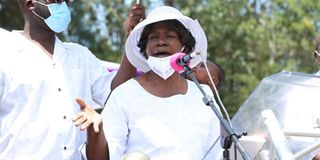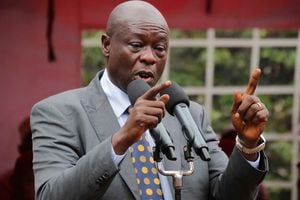Family tells of years of pain as Robert Ouko's brother Mbajah buried

Mrs Esther Mbajah speaks during the burial of the husband Eston Barrack Mbajah in Kisumu on September 10, 2020.
What you need to know:
- Dr Ouko was murdered in February 1990 and his charred remains recovered at Got Alila.
- Mr Mbajah served in various capacities in the former provincial administration.
- According to the widow, her husband fell ill immediately after the death of his brother in 1990.
- She further revealed that in 2014, her husband suffered a stroke which worsened his condition.
Mr Eston Barack Mbajah, a brother of the late former Foreign Affairs Minister Robert Ouko has been laid to rest in Nyahera, Kisumu County.
During the burial on Thursday, anger, pain, sadness and disappointment was evident in the eyes, tone and body language of relatives, friends and the political leaders present.
As family and friends paid tribute to the former administrator, the speeches at the funeral service held at Ogada Secondary School in Kisumu could be summarised in few phrases that dominated the ceremony: police brutality and torture, a thankless government and the need for cohesion.
The former minister’s daughter, Mrs Winnie Ouko Ogutu, set the tone of the ceremony, revealing how difficult it has been for the family to cope with the death of his father.
Still waiting for justice
She stated that, just like many families in Kenya, they identify with those who have never gotten justice for losing a loved one in a cruel manner.
Dr Ouko was murdered in February 1990 and his charred remains recovered at Got Alila, a few kilometres from his Kisumu home. His killers have never been brought to book.
“Our loss and pain for the last 30 years is visible and we are here to stand with many Kenyans who have gone through the same brutality the family of Ouko and the larger Joka Ominde have gone through,” she said amidst tears.
But it was the moving tribute by the widow, Mrs Esther Molly Mbajah, which revealed the pain her husband and the family have gone through in the last 30 years due to the torture meted on the former government administrator.
Mr Mbajah served in various capacities in the former provincial administration before ending up as a deputy provincial commissioner and later as a deputy secretary in the Attorney-General’s office.
He died at the age of 79 on August 16, 2020 in Tacoma, USA where he had been undergoing treatment after suffering a stroke five years ago.
Mourners went silent, drums and musical instruments were stopped and the dirges sung by Nyahera SDA Church choir were hushed as those present soaked in every detail as narrated by Mrs Mbajah.
Troubled life
According to the widow, her husband fell ill immediately after the death of his brother in 1990. She added that what troubled Mr Mbajah to his death was seeing the lifeless body of his brother at Got Alila burning, with acid in his mouth.
“On that day he came back home, rolled on the floor wailing and told me ‘Nya South, I was the only person who bypassed the security detail to go and see the charred body of my brother. They have brutally killed him’,” said Mr Mbajah.
She stated that this was the reason why her husband shared critical information with Scotland Yard detective John Troon who was investigating the murder.
“People kept on asking Mbajah why he kept on hunting for his brother’s killers. It is the sight of his brother’s body that drove him to seek the truth,” said Mrs Mbajah.
Mr Mbajah testified before a parliamentary committee that retired President Daniel Moi had summoned him days after Dr Ouko's charred body was found and asked him to make a public statement saying that, as the head of the family, he wanted the investigation halted. He declined and the police came for him.
He fled to the US and returned to Kenya after Mr Moi's regime ended in December 2002.
Tortured
Mrs Mbajah revealed that they could not sleep for the five days that police officers held her husband and tortured him.
By the time he was being brought back home by five unidentified armed police officers in the dead of the night, the family was keeping vigil ready to receive him.
When her husband went into exile in the United States, it took nine months before she, together with her children, joined him there.
“All this time Mbajah kept complaining of pain in his body and after a CT scan it was revealed that there was water on both sides of his head,” said Mrs Mbajah, adding that doctors had to drill his skull to drain the fluid.
Suffered stroke
She further revealed that in 2014, her husband suffered a stroke which worsened his condition and during this time, she had to quit her job and use the benefits she had accrued to sustain her family.
After this, the former administrator told her to prepare their house in Kisumu where they would rest peacefully.
When a religious leader visited them, Mr Mbajah stated that he had tried all he could but had forgiven his killers.
His brother Mr William Ogendo Seda, eulogised Mr Mbajah as a loving and hospitable person, recalling how he housed him when he was hunting for a job in Nairobi and how he paid for his honeymoon in Mombasa.
The politicians who attended the funeral among them governors Anyang’ Nyong’o (Kisumu), Dr Alfred Mutua (Machakos), Kisumu Deputy Governor Mathews Owili, Kisumu West MP Olago Aluoch and Kisumu County Speaker Elisha Jack Oraro, all castigated the government for denying the Ouko family justice.
“Those who tortured Mbaja and killed his brother are still around. This country has had many problems, we are at a point where we need to work together,” said Dr Mutua.
“For everybody who has gone through torture, they live with certain health complications. Sometimes when you see us not walking normally, just know that we have gone through a lot of evil things in this country,” said Prof Nyong’o.





